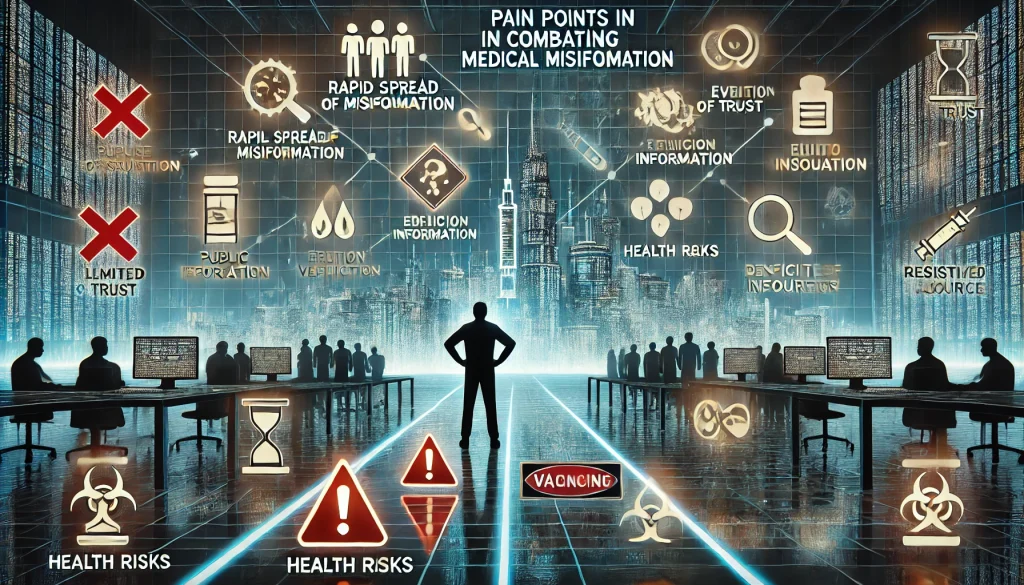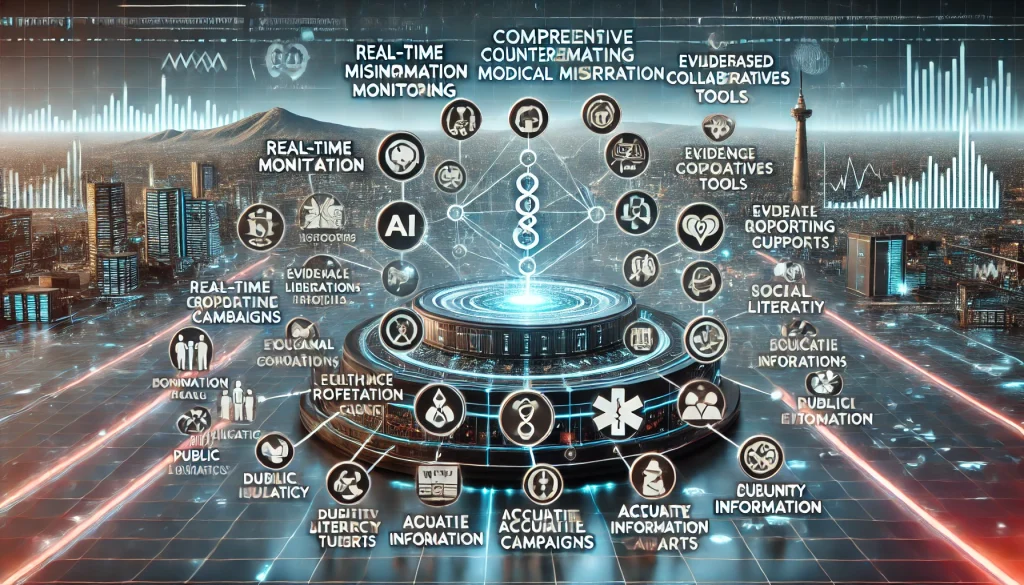Problem Statement
Medical services are increasingly challenged by the spread of misinformation, which can undermine public trust in healthcare systems. The rise of digital platforms and social media has made it easier than ever for false information to spread rapidly, often reaching millions of people within hours. This misinformation can range from misleading information about treatments and diseases to false claims about vaccinations and public health policies. As a result, the public becomes confused, mistrustful, and less likely to follow legitimate medical advice, leading to poor health outcomes and the potential for public health crises. The COVID-19 pandemic highlighted the dangers of misinformation, with false claims about the virus, treatments, and vaccines leading to significant challenges for healthcare providers and public health officials. To combat this issue, there is an urgent need for a dedicated platform that can effectively identify, counter, and prevent the spread of medical misinformation. Such a platform should leverage advanced technologies like AI and machine learning to monitor and analyze online content in real-time, quickly identifying misinformation and providing accurate, trustworthy information to the public. Additionally, the platform should collaborate with healthcare professionals, fact-checking organizations, and social media companies to ensure a coordinated and effective response to misinformation, ultimately restoring public trust in medical services
Pain Points
- Rapid Spread of Misinformation: The fast-paced nature of online platforms allows misinformation to spread quickly and widely.
- Public Confusion: Conflicting information leads to confusion and distrust in medical advice.
- Erosion of Trust: Misinformation undermines public trust in healthcare systems and professionals.
- Health Risks: False information about treatments and vaccinations can lead to poor health outcomes and public health crises.
- Difficulty in Verification: The vast amount of online content makes it challenging to verify the accuracy of information.
- Limited Resources: Healthcare providers often lack the resources to combat misinformation effectively.
- Impact on Vaccination Rates: Misinformation about vaccines can lead to reduced vaccination rates and outbreaks of preventable diseases.
- Resistance to Medical Advice: Misinformed individuals may resist following legitimate medical advice, endangering their health.
- Complexity of Digital Platforms: The diverse and complex nature of digital platforms complicates efforts to monitor and counter misinformation.
- Legal and Ethical Challenges: Balancing the need to combat misinformation with the protection of free speech and privacy rights.

Future Vision
Our platform envisions a future where medical misinformation is swiftly identified, effectively countered, and public trust in healthcare is restored. By leveraging AI, machine learning, and natural language processing, the platform will continuously monitor social media, news outlets, and other digital platforms to detect and analyze potentially harmful misinformation in real-time. When false information is identified, the platform will provide accurate, evidence-based counter-narratives, developed in collaboration with medical experts and public health authorities, to mitigate the spread of misinformation. The platform will also engage with social media companies to flag and reduce the visibility of harmful content, while promoting verified, trustworthy sources of medical information. To ensure widespread public engagement, the platform will offer user-friendly tools and resources, such as a misinformation reporting feature and educational campaigns to improve digital literacy and critical thinking skills. Additionally, the platform will work closely with healthcare professionals to provide them with up-to-date, accurate information to support their communication with patients. By fostering collaboration between tech companies, healthcare providers, and public health organizations, our platform will create a resilient and informed public, capable of navigating the digital landscape and making well-informed healthcare decisions.
Use Cases
- Real-Time Misinformation Monitoring: AI-driven tools to detect and analyze misinformation across digital platforms.
- Evidence-Based Counter-Narratives: Providing accurate, expert-backed information to counter misinformation.
- Social Media Collaboration: Working with social media companies to flag and reduce the visibility of false information.
- Misinformation Reporting: Tools for users to report misinformation and receive accurate information.
- Digital Literacy Campaigns: Educational initiatives to improve public understanding of medical information.
- Healthcare Professional Support: Providing healthcare providers with resources to combat misinformation in patient interactions.
- Public Health Alerts: Rapid dissemination of accurate information during public health crises.
- Data-Driven Insights: Analytics to track misinformation trends and assess the effectiveness of countermeasures.
- Community Engagement: Building partnerships with community organizations to spread accurate health information.
- Legal and Ethical Frameworks: Developing guidelines for combating misinformation while respecting free speech and privacy rights.
Target Users and Stakeholders
- User: Healthcare Providers, Public Health Officials, and Tech Companies
- Age Group: 30-60 years
- Gender: M/F
- Usage Pattern: Regular usage for monitoring, analyzing, and countering medical misinformation
- Benefit: Improved public trust, reduced health risks, and effective communication of medical information
- Stakeholders:
- Healthcare Providers: Hospitals, clinics, and medical professionals
- Public Health Organizations: Government agencies and NGOs focusing on public health
- Social Media Companies: Platforms where misinformation is often spread
- Fact-Checking Organizations: Groups dedicated to verifying and debunking misinformation
- Patients and General Public: Individuals seeking accurate and reliable medical information
Key Competition
- NewsGuard: Rates the credibility of news and information websites.
- First Draft: Provides tools and training for identifying and combating misinformation.
- FactCheck.org: Aims to reduce the level of deception in U.S. politics.
- Snopes: A fact-checking website that debunks myths, rumors, and misinformation.
- HealthGuard: Focuses specifically on health-related misinformation.
Products/Services
- NewsGuard Ratings: Evaluates the credibility of news sources.
- First Draft Tools: Provides resources for journalists and the public to identify misinformation.
- FactCheck.org Resources: Offers fact-checking and analysis of political claims.
- Snopes Fact-Checking: Debunks myths, rumors, and misinformation on various topics.
- HealthGuard Extension: A browser extension that identifies trustworthy health information.
Active Startups
- Blackbird.AI: Uses AI to detect and counter misinformation.
- Logically: Combines AI and human expertise to fight misinformation.
- Metafact: Crowdsources expert opinions to verify the accuracy of information.
- Factmata: Uses AI to detect misinformation and harmful content.
- Veracity.AI: AI-driven platform for verifying the credibility of online information.
- Cheq: Provides solutions to prevent the spread of misinformation in advertising.
- Tattle: A platform to detect and track misinformation on social media.
- AdVerif.ai: Uses AI to detect and combat fake news and misinformation.
- Unbiased: A decentralized platform for fact-checking and combating misinformation.
- Sensity: Focuses on detecting deepfakes and other forms of synthetic media.
Ongoing Work in Related Areas
- AI and Machine Learning: Enhancing tools for detecting and analyzing misinformation.
- Natural Language Processing (NLP): Improving the understanding of context and intent behind information.
- Social Media Analysis: Developing techniques to monitor and flag misinformation in real-time.
- Public Health Communication: Innovating strategies for effective public health messaging.
- Digital Literacy Education: Creating educational programs to improve public understanding of digital information.
Recent Investment
- Blackbird.AI: $10M in Series A funding led by Dorilton Capital, September 2021.
- Logically: $7M in Series A funding led by XTX Ventures, March 2021.
- Metafact: $1.2M in seed funding led by private investors, June 2020.
- Factmata: $1M in seed funding led by Mark Cuban, January 2018.
- Cheq: $5M in Series A funding led by Battery Ventures, April 2019.
Market Maturity
The market for platforms combating medical misinformation is rapidly maturing, driven by the urgent need to address the spread of false information in the digital age. Established companies like NewsGuard, First Draft, and FactCheck.org offer tools and resources for identifying and debunking misinformation, while innovative startups like Blackbird.AI, Logically, and Metafact are developing AI-driven solutions to detect and counter false information. Significant investments in AI, NLP, and social media analysis are transforming the industry, enabling more effective and efficient strategies for combating misinformation. As the market continues to evolve, we expect to see more integrated and advanced platforms that provide end-to-end support for monitoring, analyzing, and countering misinformation, ensuring that the public receives accurate and trustworthy medical information.
Summary
Medical services are increasingly challenged by the spread of misinformation, which can undermine public trust in healthcare systems. The rise of digital platforms has made it easier for false information to spread rapidly, leading to confusion about treatments and vaccinations and increasing the risk of public health crises. Our proposed platform leverages AI, machine learning, and NLP to provide comprehensive solutions for monitoring, analyzing, and countering medical misinformation. Key pain points include the rapid spread of misinformation, public confusion, erosion of trust, health risks, difficulty in verification, limited resources, impact on vaccination rates, resistance to medical advice, complexity of digital platforms, and legal and ethical challenges.
Target users include healthcare providers, public health officials, and tech companies, with stakeholders encompassing healthcare providers, public health organizations, social media companies, fact-checking organizations, and the general public. Key competitors like NewsGuard, First Draft, FactCheck.org, Snopes, and HealthGuard offer various tools and resources for combating misinformation. Active startups such as Blackbird.AI, Logically, Metafact, Factmata, and Veracity.AI are driving innovation in this space. Recent investments highlight significant interest and growth potential in platforms addressing medical misinformation. By addressing these challenges and leveraging advanced technologies, our platform aims to restore public trust in healthcare, mitigate the risks of misinformation, and ensure that the public receives accurate and trustworthy medical information.

